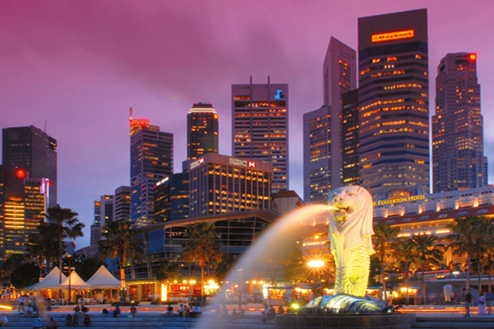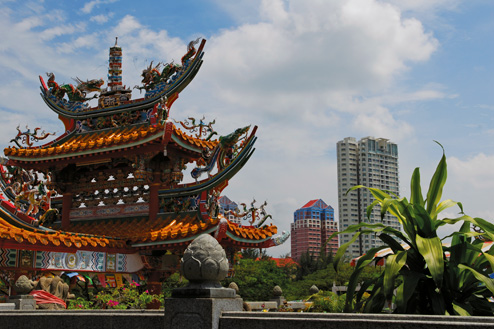Culture
Singapore has succeeded wonderfully in creating a multi-cultural society with remarkable tolerance for racial and religious differences. In the 19th and early 20th centuries, the island was substantially populated by immigrants and ethnically, Singapore is inherently diverse; Chinese, Malays, Indians and Europeans have lived side by side for many generations. The race riots of the 60s spurred the government to inculcate a singular Singaporean identity, transcending race and religion: one is first and foremost a Singaporean, and then a Chinese, Indian, Christian or whatever. In the last 30 years, Singapore has actively solicited foreigners to work here and the city-state has become truly cosmopolitan.
The country’s history has given it a unique culture. While 76% of residents are of Chinese origin, the primary medium of instruction is English. Singapore has a fundamentally Chinese culture; yet delving deeper you will detect a westernised and modern flavour. Television and cinema is overwhelmingly imported from the west. Over the past 30 years, a substantial number of Singaporeans have studied or worked in western countries; their impact on the consciousness of the Singaporean identity has, in some form or other, diluted the Chinese-ness of the culture.
There is no predominant religion and the separation of state from religion is enshrined by the constitution. The main religions practiced are Buddhism, Islam, Christianity, Hinduism and Taoism, and generations of close proximity between these has afforded an empathy towards other races. For example, when Chinese (who love pork) have a party that includes Muslim friends, the host may well have a pork dish on the table, but will ensure the pork never touches any utensil their Muslim friends may use. No offence is taken that pork is on the table: there is a fundamental understanding that each is different and a little adjustment is accordingly made. Singaporeans are generally easy-going and accommodating.
A common trait is the importance given to family, respect for elders, and priority of communal interests over the individual’s. Though culturally tolerant, Singaporeans are relatively conservative and wary of ‘western liberal attitudes’, in particular regarding sex and self-expression. Characteristic of the culture is the concept of ‘face’, which, loosely translated, means personal dignity/respect. Be careful not to cause someone to ‘lose face’ – you may not be readily forgiven.
While still a male-dominated society, institutionalised gender inequalities are uncommon. Women are highly respected and expect equality. The glass ceiling protecting traditionally male-only positions at multinational corporations and major organisations has been repeatedly breached. In marriage, it can no longer be said men are automatically the head of the household. Singapore’s culture is hard to define as it is a unique amalgam of diverse ethnicities, east and west, ancient and modern, conservative yet open to a global influence.
The country’s history has given it a unique culture. While 76% of residents are of Chinese origin, the primary medium of instruction is English. Singapore has a fundamentally Chinese culture; yet delving deeper you will detect a westernised and modern flavour. Television and cinema is overwhelmingly imported from the west. Over the past 30 years, a substantial number of Singaporeans have studied or worked in western countries; their impact on the consciousness of the Singaporean identity has, in some form or other, diluted the Chinese-ness of the culture.
There is no predominant religion and the separation of state from religion is enshrined by the constitution. The main religions practiced are Buddhism, Islam, Christianity, Hinduism and Taoism, and generations of close proximity between these has afforded an empathy towards other races. For example, when Chinese (who love pork) have a party that includes Muslim friends, the host may well have a pork dish on the table, but will ensure the pork never touches any utensil their Muslim friends may use. No offence is taken that pork is on the table: there is a fundamental understanding that each is different and a little adjustment is accordingly made. Singaporeans are generally easy-going and accommodating.
A common trait is the importance given to family, respect for elders, and priority of communal interests over the individual’s. Though culturally tolerant, Singaporeans are relatively conservative and wary of ‘western liberal attitudes’, in particular regarding sex and self-expression. Characteristic of the culture is the concept of ‘face’, which, loosely translated, means personal dignity/respect. Be careful not to cause someone to ‘lose face’ – you may not be readily forgiven.
While still a male-dominated society, institutionalised gender inequalities are uncommon. Women are highly respected and expect equality. The glass ceiling protecting traditionally male-only positions at multinational corporations and major organisations has been repeatedly breached. In marriage, it can no longer be said men are automatically the head of the household. Singapore’s culture is hard to define as it is a unique amalgam of diverse ethnicities, east and west, ancient and modern, conservative yet open to a global influence.













